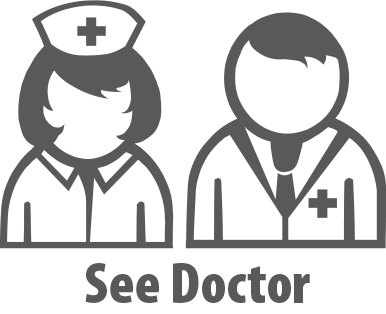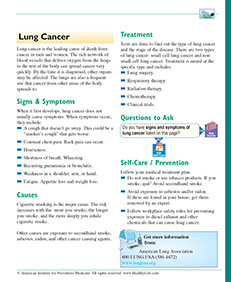Respiratory conditions
Lung Cancer
Lung cancer is the leading cause of death from cancer in men and women. The rich network of blood vessels that deliver oxygen from the lungs to the rest of the body can spread cancer very quickly. By the time it is diagnosed, other organs may be affected. The lungs are also a frequent site that cancer from other areas of the body spreads to.
Signs & Symptoms
When it first develops, lung cancer does not usually cause symptoms. When symptoms occur, they include:
• A cough that doesn’t go away. This could be a “smoker’s cough” that gets worse.
• Constant chest pain. Back pain can occur.
• Hoarseness.
• Shortness of breath. Wheezing.
• Recurring pneumonia or bronchitis.
• Weakness in a shoulder, arm, or hand.
• Fatigue. Appetite loss and weight loss.
Causes
Cigarette smoking is the major cause. The risk increases with the more you smoke, the longer you smoke, and the more deeply you inhale cigarette smoke.
Other causes are exposure to secondhand smoke, asbestos, radon, and other cancer causing agents.
Treatment
Tests are done to find out the type of lung cancer and the stage of the disease. There are two types of lung cancer: small cell lung cancer and non-small cell lung cancer. Treatment is aimed at the specific type and includes:
• Lung surgery.
• Respiratory therapy.
• Radiation therapy.
• Chemotherapy.
• Clinical trials.
Questions to Ask
Question
01
Do you have signs and symptoms of lung cancer listed on this page?

You should be seen by your doctor for medical advice. Contact your doctor or health care provider to find out how soon you should be seen.
x
Self-Care / Prevention
Follow your medical treatment plan.
• Do not smoke or use tobacco products. If you smoke, quit! Avoid secondhand smoke.
• Avoid exposure to asbestos and/or radon. If these are found in your house, get them removed by an expert.
• Follow workplace safety rules for preventing exposure to diesel exhaust and other chemicals that can cause lung cancer.
Resources

Download an offline pdf file.
2021 © American Institute for Preventive Medicine - All Rights Reserved. Disclaimer | www.HealthyLife.com








